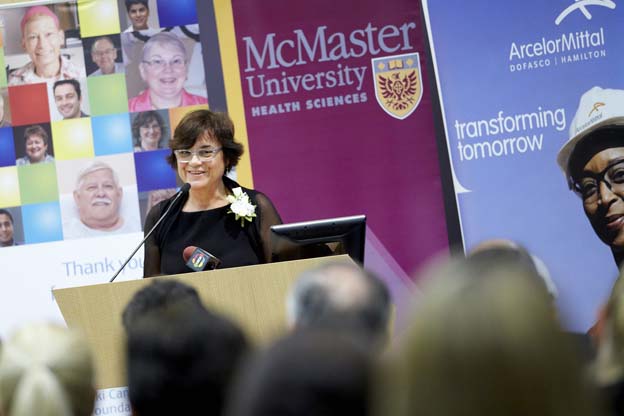New research chair will focus on novel drugs to prevent cancer

Dr. Paola Muti says that McMaster is the most suitable environment for successful cancer prevention research. Muti is the inaugural holder of the new ArcelorMittal Dofasco Chair in Experimental Cancer Therapeutics at the University.
Cancer prevention will be a key strategy to meet the growing burden of cancer. The question of how to avoid the disease, however, puzzles many patients and their doctors.
Dr. Paola Muti takes this question seriously and it’s one she will explore as the inaugural holder of the new ArcelorMittal Dofasco Chair in Experimental Cancer Therapeutics at McMaster University. Her research focuses on chemoprevention, which investigates the potential for agents including vitamins and drugs, both old and new, to prevent cancer.
Muti is a professor in the Department of Oncology at the Michael G. DeGroote School of Medicine.
The ArcelorMittal Dofasco Chair in Experimental Therapeutics is supported by a $1 million gift from ArcelorMittal Dofasco through the Hamilton Health Sciences Foundation, which will be matched with funds from McMaster’s Michael G. DeGroote Health Sciences Development Fund. The endowed chair was celebrated at a reception at the Juravinski Hospital Monday.
ArcelorMittal Dofasco President and CEO Juergen Schachler said the new chair is an investment in global health, as well as in the Hamilton community.
“Through the research chair, we expect that cancer prevention will become a wider topic of conversation and that the Escarpment Cancer Research Institute and its scientists will make Hamilton an even more accomplished centre of excellence for both the prevention and treatment of cancers,” he said.
“With Dr. Paola Muti as our new Chair, we know that this research will help to push and direct the global discussion from right here, in Hamilton.”
Dr. John Kelton, dean and vice-president of the Faculty of Health Sciences at McMaster, said: “This is visionary leadership of ArcelorMittal Dofasco to look beyond today’s treatments to support vitally important research in prevention of cancer. This partnership with McMaster is an excellent support of our communities locally, nationally and globally.”
Dr. Bill Evans, president of the Hamilton Health Sciences’ Juravinski Hospital and Cancer Centre, said exemplary care is directly linked to new discoveries and advances made through research.
“ArcelorMittal Dofasco’s transformational gift, made through Hamilton Health Sciences Foundation, displays their commitment to building a world-leading experimental therapeutics program that has the potential to change the very way cancer is treated,” said Evans, who is also the regional vice-president for Cancer Care Ontario.
Dr. Mark Levine, chair of the oncology department of the Michael G. DeGroote School of Medicine at McMaster, said: “Paola is an internationally recognized researcher in cancer prevention who brings expertise which will add an exciting new dimension to the cancer research program in Hamilton and at McMaster. We are very excited she has joined our team.”
Muti said she appreciates the “openness” with which McMaster, ArcelorMittal Dofasco and Hamilton Health Sciences officials are in welcoming her approach to treating a disease that will kill almost 76,000 Canadians this year.
“Prevention needs special social and institutionalized scientific efforts to start coordinated, focused and multidisciplinary research to accelerate the future contributions of cancer prevention to science and public health,” she said. “The ArcelorMittal Dofasco contribution will strongly support these efforts.”
She added: “McMaster University, with its innovative approach to research and gold standard for research methodology, is the most suitable environment for successful cancer prevention research.”
Muti was the scientific director of the Italian National Cancer Institute Regina Elena in Rome, Italy, and adjunct professor of epidemiology at the Harvard School of Public Health. She held the position of chair of the department of epidemiology at the NCI in Rome.
Prior to that she was a tenured professor of epidemiology in the department of social and preventive medicine at the University of Buffalo.
